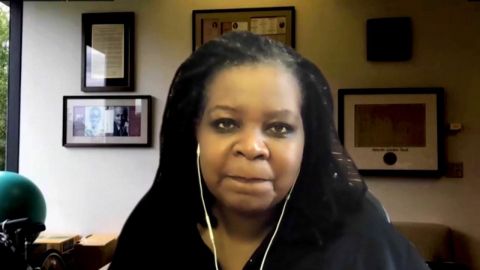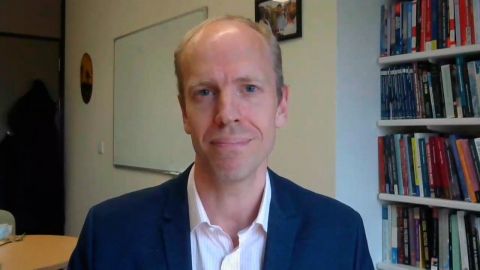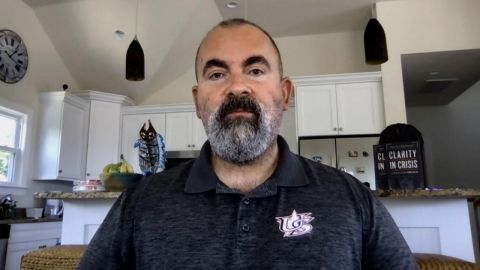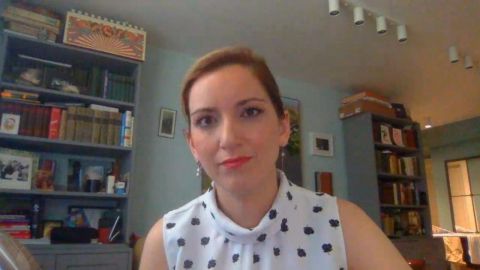Read Transcript EXPAND
BIANNA GOLODRYGA: Well, now turning to the U.S. For years, black Americans have been pushing for Juneteenth, the end of slavery, to celebrated as a
national holiday. Well, today, that dream is finally realized as President Biden signs it into a national law.
Pulitzer prize-winning historian Annette Gordon-Reed has written a new book all about that historic day on June 19, 1865. Here’s Walter Isaacson
speaking to her about what the holiday means and her own extraordinary story as the first black student to integrate into an all-white school.
(BEGIN VIDEO CLIP)
WALTER ISAACSON: Thanks, Bianna. And Professor Annette Gordon- Reed, welcome back to the show.
ANNETTE GORDON-REED, AUTHOR, “ON JUNETEENTH”: Glad to be here.
ISAACSON: You’ve just written a book on Juneteenth. Explain to us exactly what Juneteenth commemorates.
GORDON-REED: Well, it commemorates the day when United States army general Gordon Granger went to Galveston in June 19, 1865 and issued a general
order number 3, which said that slavery was over in Texas.
This was, you know, two and a half years after the Emancipation Proclamation had been signed, it was after Lee had surrendered in
Appomattox in April and after Lincoln’s death. But the army of Trans- Mississippi had kept fighting and they did not surrender until the beginning of June 1865, and that’s when Granger had gone to Galveston and
make this announcement.
ISAACSON: So, why should it be celebrated as a national holiday?
GORDON-REED: Well, because it was an event in — that marked the end, essentially, of the confederate military operation to maintain the system
of slavery, the way of life in the south. It represents to me, I think, an important day in the union and in the American Union, Texas was part of the
union and then it was brought back into the union, and I see it as a day that marks a human rights advance, the end of a system of shadow slavery
where people were treated as property, that’s something that everybody should celebrate.
I mean, obviously, it didn’t solve all problems, but it was a step along the path, that we can be seeing — we can see it as something that was in
advance in, you know, American life and an in American civilization and world civilization.
ISAACSON: Is it a fitting companion to July 4th?
GORDON-REED: I think so. I mean, that’s — I think they should be seen together, in a way. They — it’s interesting because Granger’s order
mentions equality. It not only says that the enslaved were free, it says that they would then occupy a state of absolute equality, which he didn’t
have to say. It didn’t have to be said, but I think by using that term, using those terms he references, he hooks on to the Emancipation
Proclamation and, as you know, Lincoln used the Declaration of Independence as a basis for creating what he called a new birth of freedom.
So, this notion of equality goes through all of these documents, you know, all of these documents and sort of buttresses the idea that equality is an
important goal as part of the American creed. So, yes. You know, I think it’s incredibly important for us to remember that particular day. It wasn’t
the end of all kinds of problems, but it was an advance in democracy, I think.
ISAACSON: So, enshrined in the notion of Juneteenth is not just the end of chattel slavery but the beginning and the hope for equality and social and
economic terms which was still trying to achieve.
GORDON-REED: Yes. Yes. I mean, that’s — it’s that American creed, the sort of expectation, the idealistic understanding about what America is
supposed to be about is embodied in this, and, you know, those people knew that they had a struggle ahead of them, but they also knew that by law now
it would not be legal to sell their children, to separate husband from wife, to effectuate the dispersal of families, which was the most traumatic
thing about slavery.
I mean, whipping was bad, obviously, working without — you know, for others and not being able to amass, you know, any part of property or amass
any resources that belonged to you, those things were bad. But what enslaved people really felt traumatized about was the separation of
families. And Juneteenth has evolved into a celebration that really is about families, people coming together, and not just blood relatives but
members of the community coming together and celebrating and being together, because people couldn’t do that, couldn’t be assured of doing
that in slavery.
ISAACSON: Your book is a wonderful memoir, very personal, and you describe that coming together on Juneteenth, how you as a kid growing up in rural
Texas celebrated that day.
GORDON-REED: Yes, I don’t remember a time when we didn’t celebrate it, and it was a day for, you know, kids to run around and drink too much soda
water and throw firecrackers. I mean, I can’t — every time I say that I just can’t marvel at the idea that we were allowed to have matches and
firecrackers when we were below 10 years old. I would never let my kids do that, but it was a different time.
And we just — it was fun. It was a lead-up to July 4th, but it was — when I was celebrating it, a holiday that was mainly for black Texans. And so,
it was in our communities that this was done. It became a state holiday, first officially, celebrated in 1980.
But even before then, whites — some whites had begun to celebrate it as well. But when I was a kid, it was very, very much a part of the black
community and it was a day for people to get together, eat food, men played dominos, tell stories, all of the kinds of — you know, to relax. And also,
when I got to be older, think about what the day actually commemorated, and that was the end of slavery. A very serious thing, the end of slavery in
Texas.
ISAACSON: It was very personal for you because you had a small role in the civil rights movement in first grade when your parent his sent you to what
had been an all-white school. You were like the Ruby Bridges of your town. Tell me about that experience.
GORDON-REED: Well, when I got ready to go to the first grade, I had been at kindergarten in what would have been called the black school, Booker T.
Washington School, which went from K through 12. And my parents decided to do something different. They had what was called a freedom of choice plan,
which was put in place as a subterfuge, basically, to try to get around brown and not just in Texas.
ISAACSON: Brown v. Board of Education
GORDON-REED: Brown versus Board of Education that outlawed, you know, separatism, inherently unequal. And this was an effort to — you know, it
sounds good. Freedom of choice, right? Everybody can just choose. But the expectation was that white parents would choose white schools and black
parents would choose black schools. My parents decided to do something different and send me to a white school, and that was despite the fact that
my mother taught at Booker T. Washington, my two older brothers were there in elementary school and they decided to do this.
And they talked, I am told, that there was an agreement that was made that they wouldn’t make big deal about it. No one would make a big deal about
it. I wasn’t escorted to school. There had been threats against my family but they — I probably weren’t thought of as credible. I wasn’t escorted to
school. My father took me and dropped me off. And that first year was tough, in a lot of ways. But my teacher, Mrs. Daughtry, we all know our
first-grade teacher’s names, was fabulous. She was wonderful to me.
And I wonder if it might have been because, not just being a decent human being, but that my mother was a teacher and the teachers had this kind of
camaraderie with one another. But she treated me as, you know, not as any different than other kids. Some of the kids were nice. Some of them were
not. My mother said, at one point, I broke out in hives, which might suggest a stress reaction to some of this. But for the most part, it was —
I loved school.
You know, I loved being there. I loved learning. And so — and I was a good student. I kind of wonder how it would have been if I had been struggling
as a student and that on top of other things, but because I was good at it and I’m a basically even-tempered person, I wasn’t a problem in school, you
know, things went smoothly for me, certainly in the classroom and with the teachers.
As I said, some of the kids were not so nice and some of them who were nice, if I saw them in town and was friendly to them, they would be cool.
And I figured out that they didn’t want to be seen before their parents, you know, being friendly to me. And so, that was a valuable lesson about
race and how it makes people act.
ISAACSON: You had some problems with young blacks in your community too who saw you going to the white school.
GORDON-REED: Yes. About three years after I went to Anderson, the Supreme Court struck down freedom of choice plans and then everybody had to change
schools. And there were people in the black community who were not happy about that because Booker T. Washington was sort of the nerve center of the
black community. You know, teachers were respected members of society. They were leaders in the society. They lived in the community. They socialized
with patients. I mean, it was — they knew each other. There was a closeness there that was lost when integration came.
As good as my teachers were to me, and they were, as I said, Mrs. Gillan (ph) on second grade, those two first two years, you know, they were vital.
They didn’t socialize with my parents. We were Texans but we were really separated by race socially.
So, I recall and I mentioned this in a book, a young boy standing in line next to me and he says, you know, that’s, and he sort of turns around and
starts hitting me in the chest. And I didn’t know who he was, and it was just — I knew why. I knew why he was upset with me, but I didn’t know who
he was and I —
ISAACSON: Why was he upset?
GORDON-REED: Well, he was upset because I — he saw me and was — I didn’t make the Supreme Court do this. He saw me as a symbol of his loss, you
know, that I had caused all of this. You know, now, they had to go to different schools. They had — you know, they were, you know, separated
from their community and —
ISAACSON: Was he white or black?
GORDON-REED: He was black. He was black. So, he knew, you know, that he had lost their teachers. And that’s the other thing, one reason my parents
and my mother, in particular, became somewhat disillusioned with integration, because they integrated at the level of the children, but not
the teachers. All across the south, a lot of black teachers lost their jobs. They were taken out of the classroom or moved around because white
parents didn’t want black teachers over black — white kids.
So, it was integration of the kids but not an integration of the power structure. And indeed, my parents as, you know, suggested, became the
reason for sending me to the school changed over time. When I was adult — an adult, they said, well, we knew the court was going to strike down the
plan and then you’d have to change schools, but I think there were — it was sort of a pragmatic consideration.
But from what I remember of the way people were responding when I was going to those schools, they were idealistic. This is the mid-’60s, there was a
Civil Rights Act and there’s the Voting Rights Act, they saw — they thought that black people were sort of on the move and they were part of
that. They wanted to be a part of it.
But once they saw that it didn’t work out the way they anticipated, they — I think they might have been a little self-conscious about having been so
idealistic about the possibilities with the integration of the schools.
ISAACSON: You wrestled quite a bit with the fact that your mother, in particular, became disillusioned with integration. What are all the reasons
you think went into her thinking?
GORDON-REED: Well, she would say — she had said to me a couple of times, she had gone to college and she went to Spelman and TSU for graduate
school. She said, I went to school to teach black students. They were part — it’s not that she didn’t love her white students.
It’s just that they were a part — she was a part of a generation of people who saw themselves as a sort of a vanguard. Their mission was to help the
black community teach, to help the black community — the old phrase, uplift the race. That’s what people said and that’s what they meant,
literally that, that this is what teaching was supposed to be about.
When they had integration, the mission had to change. I mean, she had students whom she loved. She was good in the classroom and they loved her
too. I’ve heard from a number of them after my book came out who were her students, but it was different because the white students — I mean, she’d
say, you know, we can’t talk to them the way we used to talk to them. You know, when they had black students, they would say, you know, you really
got to do this because, you know, we’re — you know, we have all this and, you know, they’re a part of a mission, they’re part of a — on a journey.
But white student — I mean, the society he been had been made. So — I mean, and she didn’t have to exhort them in that way. And the black
students — sort of a minority of black students in her class at that point, I mean, you know, you can’t single them out for stuff. So, you know,
she loved teaching, she loved being in the classroom, but the mission changed.
And she had been a part of a group of black female — mainly black female, some black male teachers, you know, you could imagine the faculty lounge
would be very different with that group of people than people who had never maybe socialized with blacks before. Some of her white colleagues, she made
great friends among them. But it really took a while to figure out — well, you know the south, to figure out how blacks and whites who had never
socialized together, had small talked together to do those kinds of things on an equal basis.
ISAACSON: One of the things I found fascinating in your book, “On Juneteenth,” was your love of Texas. How much you self-identify as a Texan.
Your family has been there for six generations or so since the 1820s. And you grew up in Rural Texas, experiencing a lot of discrimination, being in
the balcony of the movie theater, having the general store owner treat you poorly. Did you develop, I think, what W.E.B. Du Bois calls a dual
consciousness of being back and being a proud Texan?
GORDON-REED: I think so. I think so. The thing that I — the reasons that I have affection of the state grow out of the feelings that I had with my
family. My mother and my father, my brothers and my grandparents and the people in my community, the thing that happened to me there that were
formative. And now, the fact that there are people there who hated us, who, you know, looked down on us, that doesn’t define those experiences for me.
And I don’t believe that they are the ones who, you could say, own Texas in some way.
I mean, you know, I felt the connection to the place because my family has been there for so long and most of my family is still there now. I mean, we
are not a diaspora family. We — when my relatives moved from the country, they moved to Houston or they moved to Dallas and they moved to Austin.
They didn’t move to New York. I am the outlier here in coming — you know, leaving the borders of the state to go away to New England for school.
So, yes. If you assume — if I’m supposed to hate Texas, I’m — if Texas — think of it as an entity, what I am essentially doing, for me, and other
people can feel differently about this, but for me, that is ceding territory to other people and saying that they are the Texas and I am not.
You know, I’m an interloper. I’m an outsider. And I don’t seed that territory.
I think of myself — I thought of myself as a Texan connected to that place. And other people can have their views about me and about my family,
but I know about what happened to me there, and I know how long my people have been there, and that’s meaningful to me.
ISAACSON: Professor Annette Gordon-Reed, thank you for joining us.
GORDON-REED: Thank you for having me.
About This Episode EXPAND
Sunday is World Refugee Day, an international day designated by the United Nations to honor refugees around the world.
LEARN MORE



